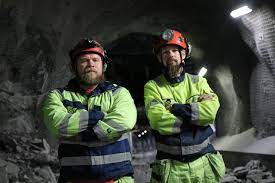STABLECOIN ISSUER TETHER TO BEGIN BITCOIN MINING OPERATIONS IN URUGUAY
In a groundbreaking move that could potentially reshape the cryptocurrency Bitcoin Mining landscape, Tether, the prominent stablecoin issuer.

In a groundbreaking move that could potentially reshape the cryptocurrency Bitcoin Mining landscape, Tether, the prominent stablecoin issuer, has announced its foray into the world of Bitcoin mining.
The company's decision to set up mining operations in Uruguay has sent shockwaves throughout the crypto community, raising questions about the implications for both the stablecoin market and the broader cryptocurrency ecosystem.
In this blog post, we will delve into the details of Tether's entry into Bitcoin mining, exploring its significance, potential impact, and the reasons behind this bold move.
Understanding Tether: The BITCOIN MINING
Before delving into Tether's recent venture into Bitcoin mining, it's essential to grasp the significance of Tether in the cryptocurrency mining machine space. Tether, often denoted as USDT, is a cryptocurrency that aims to maintain a stable value by pegging it to a reserve asset, typically the US dollar. This pegging mechanism ensures that 1 USDT remains equivalent to 1 USD, providing a crucial bridge between the volatile crypto market and traditional fiat currencies.
Tether has grown to become one of the most widely used stablecoins globally, with a market capitalization consistently ranking among the top in the cryptocurrency market. Its adoption extends beyond trading and investment, as USDT serves as a popular choice for transferring value quickly and securely within the crypto ecosystem.
Tether's Bold Move: Entering Bitcoin Mining
In a surprising turn of events, Tether has decided to venture into Bitcoin mining operations, a domain primarily associated with cryptocurrency miners and mining pools. This move represents a significant departure from Tether's traditional role as a stablecoin issuer. To understand the implications fully, let's explore the reasons behind this strategic decision.
- Ensuring Stablecoin Reserves
One of the most critical functions of Tether is to maintain adequate reserves of fiat currency to back its stablecoin tokens. To achieve this, Tether often relies on traditional banking systems, which can be prone to regulatory scrutiny and limitations. By entering Bitcoin mining, Tether seeks to generate additional revenue streams, potentially reducing its reliance on traditional banking.
- Enhancing Security and Transparency
Tether has faced its fair share of controversies and scrutiny regarding the transparency of its reserve assets. By engaging in Bitcoin mining, Tether can increase the transparency of its operations by participating in the decentralized process of securing the Bitcoin network. This move could potentially enhance trust and credibility in the stablecoin.
- Supporting the Bitcoin Ecosystem
Bitcoin mining is a fundamental component of the Bitcoin network, as miners play a vital role in processing transactions and maintaining network security. By entering the mining sector, Tether may contribute to the overall health and decentralization of the Bitcoin ecosystem, which aligns with the broader crypto mining software community's values.
- Diversifying Revenue Streams
The cryptocurrency market is highly competitive and subject to fluctuations. Stablecoin issuance alone may not provide the stable revenue Tether needs to maintain its peg consistently. By engaging in Bitcoin mining, Tether can diversify its revenue streams and potentially reduce its vulnerability to market volatility.
The Uruguay Connection
Tether's choice of Uruguay as the location for its Bitcoin mining operations is noteworthy. Uruguay, a South American country with a stable political environment and reliable infrastructure, offers several advantages for crypto mining calculator operations:
- Renewable Energy: Uruguay boasts a significant share of renewable energy in its power grid, primarily from wind and hydroelectric sources. This green energy abundance makes it an attractive destination for environmentally conscious Bitcoin mining operations.
- Political Stability: Uruguay is known for its political stability and a supportive regulatory environment for crypto mining sites businesses. This stability minimizes the risks associated with sudden policy changes that can affect crypto operations in other regions.
- Geographic Advantages: Uruguay's strategic location between North and South America positions it favorably for international cryptocurrency transactions and connectivity.
- Access to Skilled Workforce: Uruguay has a well-educated and skilled workforce, which can be crucial for the technical demands of Bitcoin mining operations.
Impact on the Stablecoin Market
Tether's entry into Bitcoin mining raises several intriguing questions about the potential impact on the stablecoin market. While Tether's stablecoin dominance is unlikely to wane immediately, this move has the potential to:
- Encourage Others: If Tether's foray into Bitcoin mining proves successful, other stablecoin issuers may consider similar diversification strategies, potentially reshaping the landscape of stablecoins.
- Enhance Trust: Increased transparency through mining operations could enhance trust in Tether and other stablecoins, potentially attracting more users and investors.
- Regulatory Scrutiny: Tether's expanding role in the bitcoins mining app ecosystem may draw more regulatory attention. As a result, stablecoins, including Tether, may face increased scrutiny and potential regulatory changes.
Tether's decision to enter the world of Bitcoin mining in Uruguay represents a significant development in the cryptocurrency space. While the full implications of this move remain to be seen, it underscores the dynamic and evolving nature of the crypto industry.
Tether's effort to diversify its operations and enhance transparency could have far-reaching consequences, potentially affecting not only the stablecoin market but also the broader cryptocoin mining rig ecosystem.
As Tether's mining operations in Uruguay take shape, they are sure to be closely monitored by industry participants, regulators, and cryptocurrency enthusiasts worldwide.
What's Your Reaction?
















